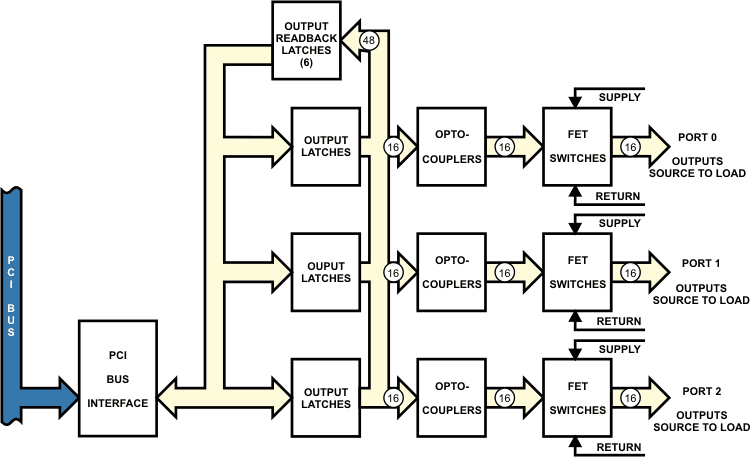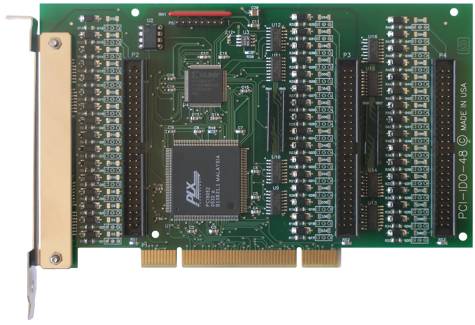PCI-IDO-48(A) Series Solid State Relay Cards
Features
- 16, 32, or 48 individually optically isolated solid-state outputs
- “A” version supports Simultaneous output across all ports via external rising edge on P2 pin 50
- Solid-state design permits high-speed switching and long-life expectancy
- Load voltages up to 60 Volts, current up to 2A
- Lower cost per point than externally-racked solid-state relay modules
- Optically isolated channel to channel and channel to ground
- Universal PCI, PCI-X, 3.3V and 5V compatible (Call for PCI-Express availability)
- Designed, made, supported, and manufactured in the USA
- Support for Wind River VxWorks (call for ordering information)
$398.00 – $698.00
In StockDescription
16, 32, and 48 Channel Isolated Solid-State Output Cards
PCI-IDO-xx(A) Series cards offer a range of 16, 32, or 48 individual, optically isolated differential outputs. These cards are ideal for use in control and instrumentation applications where high-voltage protection is required. Individual channel-to-channel isolation allows every channel to be physically and electrically separated from the others.
The “A” version supports simultaneous output across all ports via external rising edge on P2 pin 50
The opto-isolated outputs use solid-state, P-Channel FET switches, providing a much faster turn-on and turn-off time and higher life expectancy than electromechanical relays. User-supplied load voltages can range from 5V to 60V.
The logic on the chip allows the application to read what was written to the latches. Diodes are included across the load for inductive-spike protection.
These cards are especially useful in applications where high common-mode external voltages are present. Isolation is required to guard electronics from transient voltage spikes and offers greater common-mode noise rejection in electronically noisy surroundings containing industrial machinery and inductive loads. These applications include factory automation, energy management, industrial ON/OFF control, security systems, manufacturing test, and process monitoring. In addition to protecting industrial applications from accidental contact with high external voltages, the isolation provided eliminates troublesome ground loops. Connections are available via 50-pin IDC type headers, ribbon cables, and a variety of screw terminal boards. A strain relief bar where the cables exit the card assures that the cables will not interfere with adjacent cards. Standard cables are six feet long but alternate lengths are available.
SOFTWARE
These cards are supported for use in most operating systems and include a free DOS, Linux (including Mac OS X) and Windows XP -> 10, both 32 & 64 bit compatible software package. This package contains sample programs and source code in “C” for DOS, and Visual Basic, Delphi, and Visual C++ for Windows. Also incorporated is a graphical setup program in Windows. Linux support includes installation files and basic samples for programming from user level via an open source kernel driver. Third party support includes a Windows standard DLL interface usable from the most popular application programs, and includes example LabVIEW VIs. Embedded OS support includes Windows Xpe, WES7, etc.
Downloads
Manuals
Software
- PCI-IDO-48 Family Software Package ( -- Last Uploaded 2024-12-19)
Drivers and Downloads
Full list of available Downloads: Software Packages, Drivers, Manuals, and other documents
Information about our Free Software packages:
ACCES is proud to provide a full suite of software support with every Data Acquisition product. We are committed to supporting the most popular operating systems and platforms for our customers. Currently we are actively supporting 7 -> 11, both 32 & 64 bit, including “Server 2008,” “Embedded,” and “Compact” flavors for all plug-and-play products including PCI, PCI Express, USB, and more. Many products continue to ship with support for additional operating systems such as DOS, Windows 95, 98, Me, NT4, 2000, and XP.
Samples
Among the software we deliver with our products are sample programs in a wide variety of programming languages. These samples are used to demonstrate the software interfaces to our products — and many can be used as-is in your production environments, or to test functionality of the devices out-of-the-box. We’re currently actively supporting sample programs in Microsoft Visual C#, and Delphi, with many devices including samples in Visual Basic (5 and .NET), Visual C/C++, and Borland C/C++ 3.1 for DOS. Additionally we provide National Instruments LabVIEW compatible DLLs and many demonstration VIs for our devices.
Drivers
Drivers for various operating systems are also provided, including active support for Windows 7 -> 11 — all in both 32-bit and 64-bit flavors, and including consumer, server, and embedded varieties — as well as the 2.6 and newer Linux kernels and recent OSX / macOS versions. Many products continue to ship with driver support for Windows 95, 98, Me, NT4, Windows 2000, XP, and more, but support for these operating systems is considered deprecated.
Setup Programs and Utilities
Our Data Acquisition devices also include a graphical setup utility that walks you through the process of configuring any option jumpers or switches on the device, as well as explaining a little about the various connectors present.
Many devices also include utility programs – little tools to make your use of the device easier, such as EWriter, a program that allows you to read and write data in the user-accessible EEPROM locations on all our USB data acquisition products; or WinRISC, a “Really Incredibly Simple Communications” terminal program that lets you get started instantly with serial devices.
“Register Level” Documentation
Besides all this software in all these languages and operating systems ACCES has a policy of open and transparent development: none of our lowest-level “register” interfaces are hidden from you — we document every register in every bus card, every command in every serial board, and every usb control transfer in every USB Data Acquisition board. These lowest-level interfaces allow you to develop for our products in ANY operating system or language, regardless of our actively supporting it or having a driver for it. We have customers actively developing in ADA, Android, Python, Java, MATLAB, Solaris, and more, just by referring to our complete low-level interface documentation! And we provide the full source code to all of our drivers, regardless of operating system, to give you an even bigger head start in your own development tasks.
No Fees or Royalties
All of this software is provided at no additional charge, and is licensed under any of a variety of flexible — and royalty free — options. Check out our software license explanation if you’d like more information.
Custom Software
ACCES also offers Custom Software Services for our products. Our prices are unbelievably low, often as inexpensive as free! If you need something tweaked to support your needs, or an entire enterprise application developed from scratch, it is definitely worth your time to inquire with us, first.
Further information about available ACCES Software:
Redistributing Windows Drivers
A list of ACCES drivers and the files that compose them under different versions of Windows, so you can easily redistribute ACCES cards and drivers.
aioWDM.VxWorks
ACCES has successfully partnered with Wind River to bring our entire line of PCI and PCI Express DAQ cards to VxWorks 7!
VxWorks 7 VxBus Gen 2 drivers, with easy-to-use API-libraries, are available for this product, including full source and sample code.
Designed to be compatible with our AIOWDM.dll Windows driver & API, this kernel module adds zero% CPU-cycle overhead to your VxWorks runtimes while allowing the lowest-latency hardware register access possible.
You can find more information about our VxWorks libraries and services on our Wind River Silver Partner page.

Outputs
- Number of Channels: 16, 32, or 48
- Load Voltage Range: 5V to 60V (Voltage supplied by User)
- Load Current per Channel: 1A max. steady state, 2A pulse (Note: Current may be limited by the cable. Certain ribbon cables limit current to 0.5A.)
- Isolation: Optically isolated Channel-to-ground and channel-to-channel (* see note)
- Switching Time:
- Turn-On 50µs
- Turn-Off 5µs, inductive-spike protection via a diode
- Switch Resistance: 0.4Ω when saturated
- Switch Leakage Current: 100 to 300µA
- Power Required: +5VDC @ 245mA (48 bits)
- The “A” version supports simultaneous output across all ports via external rising edge on P2 pin 50
*Note on Isolation: Opto-Isolators and connectors are rated for at least 500V, but isolation voltage breakdowns will vary and are affected by factors like cabling, spacing of pins, spacing between traces on the PCB, humidity, dust and other environmental factors. This is a safety issue so a careful approach is required. For CE certification, isolation was specified at 60V DC. The design intention was to eliminate the influence of common mode. Use proper wiring techniques to minimize voltage between channels and to ground. Tolerance of higher isolation voltage can be obtained on request by applying a conformal coating to the board.
Environmental
- Operating Temperature Range: 0°C to +70°C
- Storage Temperature Range: -40°C to +150°C
- Humidity: 5% to 90% RH, non-condensing
Board Dimensions: 6.875″ (174.6mm) long
Regulatory Compliance
This product is in full compliance with CE requirements.
| Model | Description | Price (USD) | |
|---|---|---|---|
| PCI-IDO-48A | PCI, 48 High Side Outputs, Supports simultaneous on Rising Edge | $698.00 | |
| PCI-IDO-48 | PCI, 48 High Side Outputs | $658.00 | |
| PCI-IDO-32A | PCI, 32 High Side Outputs, Supports simultaneous on Rising Edge | $578.00 | |
| PCI-IDO-32 | PCI, 32 High Side Outputs | $538.00 | |
| PCI-IDO-16A | PCI, 16 High Side Outputs, Supports simultaneous on Rising Edge | $438.00 | |
| PCI-IDO-16 | PCI, 16 High Side Outputs | $398.00 |
| Accessories | |
|---|---|
| CAB50F-XX | 50 pin ribbon cable with female headers, various lengths |
| C104-50F-XX | 50-pin ribbon cable with female headers, various lengths |
| STB-50 | DIN-rail mountable screw terminal board for 50 pin header type connector |
| DIN-SNAP | 1′ SNAP-TRACK, 4 clips, mounts up to two STB-50’s to DIN Rail |
| DIN-SNAP-6 | 6″ SNAP-TRACK, 2 clips, mounts one STB-50 to DIN Rail |

